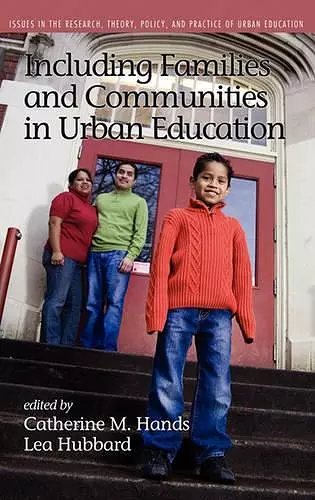Including Families And Communities In Urban Education
Lea Hubbard editor Catherine M Hands editor
Format:Hardback
Publisher:Information Age Publishing
Published:16th Mar '11
Currently unavailable, currently targeted to be due back around 16th April 2025, but could change

A volume in Issues in Urban Education Series Editors Denise E. Armstrong, Brock University and Brenda J. McMahon, Florida State University This book is intended to examine in depth the issues surrounding family and community involvement initially presented in the book, Inclusion in Urban Educational Environments: Addressing Issues of Diversity, Equity, and Social Justice. It contributes to the ongoing conversations in academia as well as in the profession around effectively engaging all families in their children's education, and building relationships with diverse community members around common educational goals. The book seeks to address issues related to structure, culture, and the agency of individuals and educational organizations. Structure refers to the external forces that impose upon and attempt to define social action, particularly, the institutional arrangements that schools, families and communities have traditionally held in relationship to each other and to the district, state and federal government. Education is tied system of class relations that structures racism, classism and sexism in response to the desire of dominant groups to preserve their privilege and power. The consequence is the economic position of low-income ethnic minority students, the population that we find most frequently in urban schools, is merely reproduced. Students and families from these backgrounds often feel alienated and marginalized and thus unable to engage actively with schools that are viewed as representing the interests of the white middle class. Understanding the success and failures of school, family and community partnerships also demands an examination of the cultural factors that are involved. By looking at culture, both that of the school and the community, we gain a better understanding of how the ideologies, beliefs and values held by the various constituents give rise to ideological conflicts that may impede collaborations. Partnerships are driven by the individual actions or agency of those involved. This collection demonstrates how actions or agency are tied to structural and cultural factors, including racial, ethnic, class, linguistic and gendered positions. Through the contributions of a team of authors who examine family and community involvement in education, a compelling argument is made for the need to attend to issues of structure, culture, and agency. Typically applied to school reform and change issues, this framework adds a new perspective to the family and community involvement...
ISBN: 9781617354007
Dimensions: unknown
Weight: unknown
250 pages